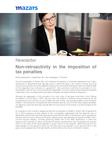
Non-retroactivity in the imposition of tax penalties
The third paragraph of Article 338 of the Political Constitution of Colombia establishes that "Laws, ordinances or agreements that regulate taxes in which the base is the result of events occurring during a given period, cannot be applied except as from the period that begins after the effective date of the respective law, ordinance or agreement". Such provision enshrines the principle of non-retroactivity of the tax law, which prohibits the application of current rules to past situations protected under other rules, to safeguard the principles of legality and legal certainty of taxpayers.
Although the application of this principle is not new, since it has been enshrined in the Political Constitution of Colombia of 1991 and has been the subject of different pronouncements by the Constitutional Court and the Council of State, the truth is that, in tax penalty matters, some territorial entities, in the issuance of the particular administrative acts by virtue of which they impose penalties, are applying rules that have been issued after the occurrence of the events or conduct subject to the penalties.
An example of this is what is happening with the municipality of Medellín. Article 195 of Agreement 64 of 2012 (previous income statute of the municipality) established that the absolute lack of declaration would entail a penalty equivalent to sixty percent (60%) of the total annual tax payable for Industry and Commerce notices and boards. Said provision was repealed by Agreement 066 of 2017 (current revenue statute), currently governing Article 244 of the latter Agreement, in which the quantum of the penalty for failure to declare the above-mentioned tax was increased to ten percent (10%) of the value of the bank deposits or gross income of the taxpayer, determined by the Tax Administration for the period to which the non-filed return corresponds, or ten percent (10%) of the gross income appearing in the last Industry and Commerce Tax return, whichever is higher.
The Council of State, on several occasions [1] , has stated that in matters of penalties, the applicable rules are those in force at the time the punishable conduct occurs, regardless of whether the administrative action of verification of compliance with tax obligations and the issuance of the penalizing acts occurs subsequently.
That is why if a taxpayer obliged to file an Industry and Commerce tax return in the municipality of Medellin, for the taxable year 2014 fiscal year 2015, did not do so, he must be sanctioned based on the regulations applicable in the latter year (article 195 of Agreement 64 of 2012), since in the same year the punishable conduct -not filing the return- occurred, regardless of whether the administration initiated the sanctioning process subsequently and under the protection of a new rule.
Despite this, the municipality of Medellín has been issuing resolutions by virtue of which penalties are imposed on taxpayers for failure to declare corresponding to the taxable years 2014 and 2015, quantifying the same based on the provisions of Article 244 of Agreement 66 of 2017, that is, it bases the administrative acts on a rule subsequent to the occurrence of the punishable conducts, palpably violating the mandate enshrined in Article 338 of the Political Constitution of Colombia.
Since by virtue of Article 88 of Law 1437 of 2011 there is a presumption of legality on administrative acts until they are not annulled by the administrative contentious jurisdiction, it will be up to the taxpayers affected by such illegal acts to file the appeal for reconsideration against the sanction resolution in order to request the revocation of such administrative acts and exhaust the administrative venue, so that, in case the administration maintains its position, they can go to the administrative contentious jurisdiction to request its nullity.


